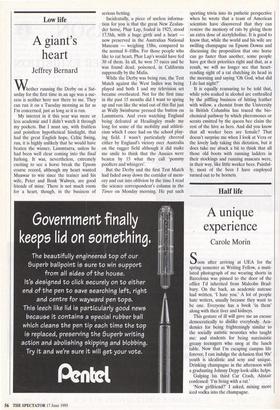Low life
A giant's heart
Jeffrey Bernard
blether running the Derby on a Sat- urday for the first time in an age was a suc- cess is neither here nor there to me. They can run it on a Tuesday morning as far as I'm concerned, just as long as it is run.
My interest in it this year was more or less academic and I didn't watch it through my pockets. But I must say, with fruitless and pointless hypothetical hindsight, that had the great English hope, Celtic Swing, run, it is highly unlikely that he would have beaten the winner, Lammtarra, unless he had been well clear coming into the final furlong. It was, nevertheless, extremely exciting to see a horse break the Epsom course record, although my heart wanted Munwar to win since the trainer and his wife, Peter and Bonk Walwyn, are good friends of mine. There is not much room for a heart, though, in the business of serious betting.
Incidentally, a piece of useless informa- tion for you is that the great New Zealan- der horse, Phar Lap, foaled in 1925, stood 17.5hh, with a huge girth and a heart now preserved in the Australian National Museum — weighing 151bs, compared to the normal 8-101bs. For those people who like to eat heart, Phar Lap's would have fed 30 of them. In all, he won 37 races and he was found dead, poisoned, in California supposedly by the Mafia.
While the Derby was being run, the Test Match against the West Indies was being played and both I and my television set became overheated. Not for the first time in the past 15 months did I want to spring up and run like the wind out of this flat just as Wally Swinburne pressed the button on Lammtarra. And even watching England being defeated at Headingley made me long for some of the mobility and athleti- cism which I once had on the school play- ing field. I wasn't particularly cheered either by England's victory over Australia on the rugger field although it did make me smile to think that the Aussies were beaten by 15 what they call 'pommy poofters and whingers'.
But the Derby and the first Test Match had faded away down the corridor of mem- ory and out into oblivion by the time I read the science correspondent's column in the Times on Monday morning. He put such sporting trivia into its pathetic perspective when he wrote that a team of American scientists have discovered that they can restore the memory of rats by giving them an extra dose of acetylcholine. It is good to know that, while the world and his wife are swilling champagne on Epsom Downs and discussing the proposition that one horse can go faster than another, some people have got their priorities right and that, as a result, we will no longer see that heart- rending sight of a rat clutching its head in the morning and saying 'Oh God, what did I do last night?'
It is equally reassuring to be told that, while yobs soaked in alcohol are enthralled by the piffling business of hitting leather with willow, a chemist from the University in British Columbia has traced the bio- chemical pathway by which pheromones or scents emitted by the queen bee claim the rest of the hive as hers. And did you know that all worker bees are female? That doesn't surprise me when I look at Vera or the lovely lady taking this dictation, but it does take me aback a bit to think that all those old boots with running ladders in their stockings and running mascara were, in their way, like little worker bees. Painful- ly, most of the bees I have employed turned out to be hornets.


































































 Previous page
Previous page